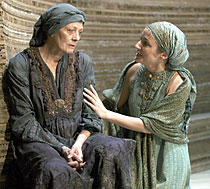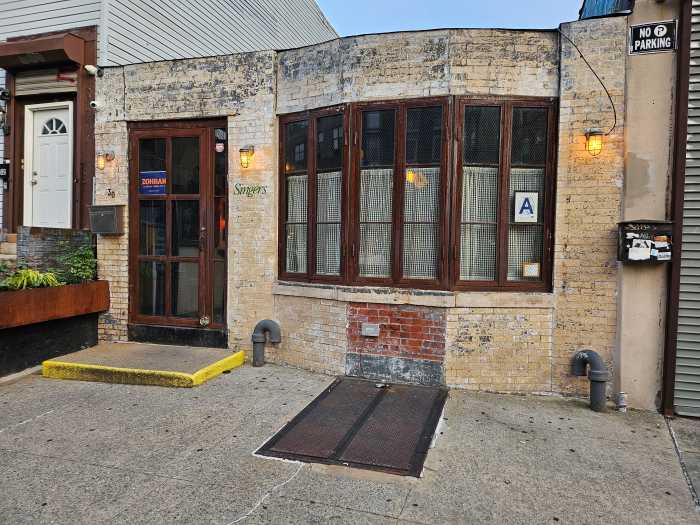When poet, translator and director Tony
Harrison accepted the Royal Shakespeare Company’s commission
to translate Euripides’ 2,500-year-old tragedy, "Hecuba,"
it was primarily because Vanessa Redgrave was going to play the
title role.
But when the play – and Redgrave’s performance – received mixed
reviews in the UK, he knew he had to take the director’s reins
away from Laurence Boswell. So when the play comes to the Brooklyn
Academy of Music on June 17, it will most certainly bear Harrison’s
directorial imprint.
Although Harrison, who is wary of handing his writing over to
directors, frequently helms productions of his own work – "Poetry
or Bust (1993), "The Kaisers of Carnuntum" (1995) and
"The Labourers of Herakles" (1995) – he told GO Brooklyn
in a phone interview from London May 25 that stepping in at such
a late date was "not what I wanted to do."
"Normally, I would start the project," explained Harrison.
"In this case, the Royal Shakespeare Company asked if I
would do a version of ’Hecuba.’ I did it because I’ve done this
kind of stuff before [’The Oresteia’ was awarded the 1981 European
Translation Prize] and because of Vanessa.
"I thought she absolutely was the right person," said
Harrison. "I did think it was irresistible. She’s not only
a great actress but also the right age. And she has great political
passion." The Academy Award-winning Redgrave (1977’s "Julia"),
won a 2003 Tony Award for her performance as Mary Tyrone in Eugene
O’Neill’s "Long Day’s Journey into Night."
Harrison blames his star’s unhappiness with the London version
of "Hecuba," which was staged at the Albery Theatre
through May 7, on Boswell.
"The worst disaster was seeing Vanessa demoralized by a
dysfunctional director. Anyone who can demoralize Vanessa, a
great spirit in theater, has to have a problem.
"It was my duty to rescue her." (Attempts to reach
Boswell for comment by press time were unsuccessful.)
Brooklyn audiences have a special reason for being grateful to
Harrison.
"She wouldn’t have come to America if I hadn’t taken over,"
he said. "I had to give her back her belief in the play."
Harrison’s passion for the play, about the aftermath of the Trojan
Wars and "an old woman and a queen and the most reduced
person of all," is infectious. He certainly believes its
themes of conflict between East (Troy) and West (Greece) and
the limits of revenge are "from the pages of yesterday’s
papers."
As the Trojan queen, Hecuba (Redgrave) seeks revenge for the
murder of her son.
"Euripides makes people think about the nature of vengeance
and its limitations," said Harrison. "The chorus of
Trojan women uses her need for vengeance as a substitute for
their own. They all subscribe to the death of the person who
killed her son – but no further."
For Harrison, the similarities between Euripides’ tragedy and
current events are "much more painful and uncomfortable,"
and they are so obvious, they don’t need to be pushed.
"Ten Greek cities invaded Troy. It was a coalition. So I
used the word ’coalition,’" he explained. "The setting
is any conflict now, haunted by an ancient play."
Harrison said he has "always taken inspiration from the
Greek mentality," and he has cast this production of "Hecuba"
in a classical light, with help from lighting designer Adam Silverman.
"When the play was originally performed, it was in the full
light of day," explained Harrison. "The actors and
the audience could see each other and beyond to the source of
power. So we’ll be doing the play with lots of light.
"At the Kennedy Center [where ’Hecuba’ plays before coming
to BAM], I’ve told the actors to perform as if the walls were
made of glass," said Harrison. "The Greeks believed
that when the worst happens, the most light is shed. So we increase
the light incrementally until when the worst happens, it’s at
its maximum."
Although Harrison’s career has included a substantial amount
of directing, he calls it a "bull—- career" and points
out that for 2000 years, directors were pretty much unknown in
European theater and are mostly a modern innovation. If something
has been lost with the intrusion of the director into the actor-poet
relationship, Harrison believes that he was able to "liberate"
Redgrave, and in doing so, liberated the entire cast. As a result,
the show’s reception in D.C. has been "wonderful,"
said Harrison.
"Every time Vanessa comes on, she gets a standing ovation,"
he said. But what pleases Harrison the most, he said, is that
"She’s found the role. She’s stopped being demoralized."
He recounted a story that amply illustrated his point.
"I saw Vanessa after one run-through [of ’Hecuba,’ as directed
by Harrison] and it was raining, a big storm," he recalled.
"She had an umbrella. And she did the whole number in ’Singin’
in the Rain.’ And I thought, okay, we’re going to win."
The Royal Shakespeare Company’s production
of "Hecuba" plays June 17-18, and June 21-25 at 7:30
pm, June 18 and 25 at 2 pm and June 19 and 26 at 3 pm at the
BAM Howard Gilman Opera House (30 Lafayette Ave. at Ashland Place
in Fort Greene). Tickets are $30, $45, $65 and $85. For tickets
and information call BAM Ticket Services at (718) 636-4100 or
visit the Web site at www.bam.org.

























